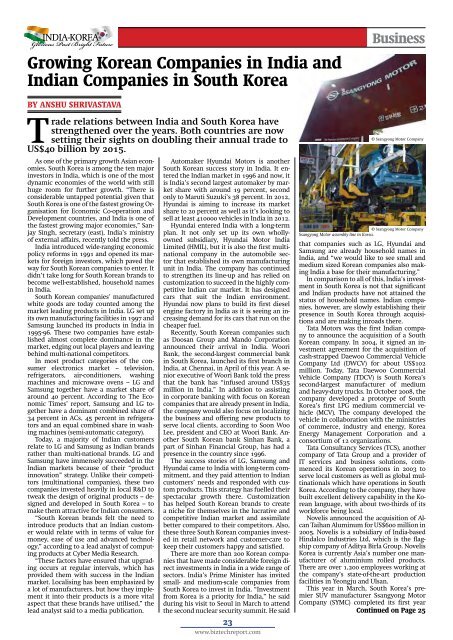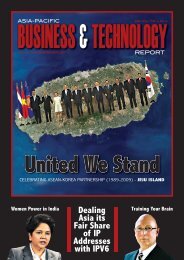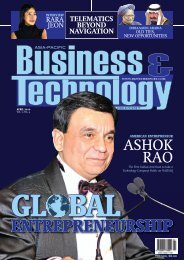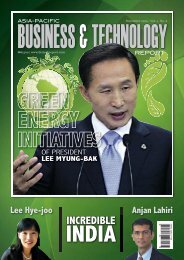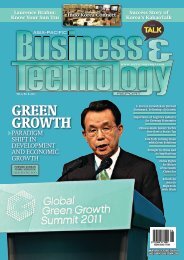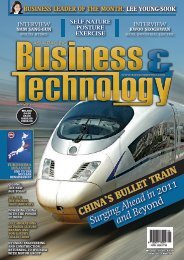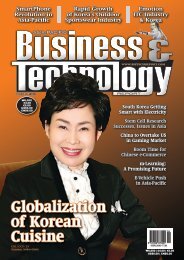INDIA-KOREA - Asia-Pacific Business and Technology Report
INDIA-KOREA - Asia-Pacific Business and Technology Report
INDIA-KOREA - Asia-Pacific Business and Technology Report
You also want an ePaper? Increase the reach of your titles
YUMPU automatically turns print PDFs into web optimized ePapers that Google loves.
<strong>INDIA</strong>-<strong>KOREA</strong><br />
Glorious Past Bright Future<br />
Growing Korean Companies in India <strong>and</strong><br />
Indian Companies in South Korea<br />
<strong>Business</strong><br />
by Anshu Shrivastava<br />
Trade relations between India <strong>and</strong> South Korea have<br />
strengthened over the years. Both countries are now<br />
setting their sights on doubling their annual trade to<br />
US$40 billion by 2015.<br />
As one of the primary growth <strong>Asia</strong>n economies,<br />
South Korea is among the ten major<br />
investors in India, which is one of the most<br />
dynamic economies of the world with still<br />
huge room for further growth. “There is<br />
considerable untapped potential given that<br />
South Korea is one of the fastest growing Organisation<br />
for Economic Co-operation <strong>and</strong><br />
Development countries, <strong>and</strong> India is one of<br />
the fastest growing major economies,” Sanjay<br />
Singh, secretary (east), India’s ministry<br />
of external affairs, recently told the press.<br />
India introduced wide-ranging economic<br />
policy reforms in 1991 <strong>and</strong> opened its markets<br />
for foreign investors, which paved the<br />
way for South Korean companies to enter. It<br />
didn’t take long for South Korean br<strong>and</strong>s to<br />
become well-established, household names<br />
in India.<br />
South Korean companies’ manufactured<br />
white goods are today counted among the<br />
market leading products in India. LG set up<br />
its own manufacturing facilities in 1997 <strong>and</strong><br />
Samsung launched its products in India in<br />
1995-96. These two companies have established<br />
almost complete dominance in the<br />
market, edging out local players <strong>and</strong> leaving<br />
behind multi-national competitors.<br />
In most product categories of the consumer<br />
electronics market -- television,<br />
refrigerators, air-conditioners, washing<br />
machines <strong>and</strong> microwave ovens -- LG <strong>and</strong><br />
Samsung together have a market share of<br />
around 40 percent. According to The Economic<br />
Times’ report, Samsung <strong>and</strong> LG together<br />
have a dominant combined share of<br />
34 percent in ACs, 45 percent in refrigerators<br />
<strong>and</strong> an equal combined share in washing<br />
machines (semi-automatic category).<br />
Today, a majority of Indian customers<br />
relate to LG <strong>and</strong> Samsung as Indian br<strong>and</strong>s<br />
rather than multi-national br<strong>and</strong>s. LG <strong>and</strong><br />
Samsung have immensely succeeded in the<br />
Indian markets because of their “product<br />
innovation” strategy. Unlike their competitors<br />
(multinational companies), these two<br />
companies invested heavily in local R&D to<br />
tweak the design of original products -- designed<br />
<strong>and</strong> developed in South Korea -- to<br />
make them attractive for Indian consumers.<br />
“South Korean br<strong>and</strong>s felt the need to<br />
introduce products that an Indian customer<br />
would relate with in terms of value for<br />
money, ease of use <strong>and</strong> advanced technology,”<br />
according to a lead analyst of computing<br />
products at Cyber Media Research.<br />
“These factors have ensured that upgrading<br />
occurs at regular intervals, which has<br />
provided them with success in the Indian<br />
market. Localising has been emphasized by<br />
a lot of manufacturers, but how they implement<br />
it into their products is a more vital<br />
aspect that these br<strong>and</strong>s have utilised,” the<br />
lead analyst said to a media publication.<br />
Automaker Hyundai Motors is another<br />
South Korean success story in India. It entered<br />
the Indian market in 1996 <strong>and</strong> now, it<br />
is India’s second largest automaker by market<br />
share with around 19 percent, second<br />
only to Maruti Suzuki’s 38 percent. In 2012,<br />
Hyundai is aiming to increase its market<br />
share to 20 percent as well as it’s looking to<br />
sell at least 410000 vehicles in India in 2012.<br />
Hyundai entered India with a long-term<br />
plan. It not only set up its own whollyowned<br />
subsidiary, Hyundai Motor India<br />
Limited (HMIL), but it is also the first multinational<br />
company in the automobile sector<br />
that established its own manufacturing<br />
unit in India. The company has continued<br />
to strengthen its line-up <strong>and</strong> has relied on<br />
customization to succeed in the highly competitive<br />
Indian car market. It has designed<br />
cars that suit the Indian environment.<br />
Hyundai now plans to build its first diesel<br />
engine factory in India as it is seeing an increasing<br />
dem<strong>and</strong> for its cars that run on the<br />
cheaper fuel.<br />
Recently, South Korean companies such<br />
as Doosan Group <strong>and</strong> M<strong>and</strong>o Corporation<br />
announced their arrival in India. Woori<br />
Bank, the second-largest commercial bank<br />
in South Korea, launched its first branch in<br />
India, at Chennai, in April of this year. A senior<br />
executive of Woori Bank told the press<br />
that the bank has “infused around US$35<br />
million in India.” In addition to assisting<br />
in corporate banking with focus on Korean<br />
companies that are already present in India,<br />
the company would also focus on localizing<br />
the business <strong>and</strong> offering new products to<br />
serve local clients, according to Soon Woo<br />
Lee, president <strong>and</strong> CEO at Woori Bank. Another<br />
South Korean bank Sinhan Bank, a<br />
part of Sinhan Financial Group, has had a<br />
presence in the country since 1996.<br />
The success stories of LG, Samsung <strong>and</strong><br />
Hyundai came to India with long-term commitment,<br />
<strong>and</strong> they paid attention to Indian<br />
customers’ needs <strong>and</strong> responded with custom<br />
products. This strategy has fuelled their<br />
spectacular growth there. Customization<br />
has helped South Korean br<strong>and</strong>s to create<br />
a niche for themselves in the lucrative <strong>and</strong><br />
competitive Indian market <strong>and</strong> assimilate<br />
better compared to their competitors. Also,<br />
these three South Korean companies invested<br />
in retail network <strong>and</strong> customer-care to<br />
keep their customers happy <strong>and</strong> satisfied.<br />
There are more than 200 Korean companies<br />
that have made considerable foreign direct<br />
investments in India in a wide range of<br />
sectors. India’s Prime Minister has invited<br />
small- <strong>and</strong> medium-scale companies from<br />
South Korea to invest in India. “Investment<br />
from Korea is a priority for India,” he said<br />
during his visit to Seoul in March to attend<br />
the second nuclear security summit. He said<br />
23<br />
www.biztechreport.com<br />
© Ssangyong Motor Company<br />
© Ssangyong Motor Company<br />
Ssangyong Motor assembly line in Korea.<br />
that companies such as LG, Hyundai <strong>and</strong><br />
Samsung are already household names in<br />
India, <strong>and</strong> “we would like to see small <strong>and</strong><br />
medium sized Korean companies also making<br />
India a base for their manufacturing.”<br />
In comparison to all of this, India’s investment<br />
in South Korea is not that significant<br />
<strong>and</strong> Indian products have not attained the<br />
status of household names. Indian companies,<br />
however, are slowly establishing their<br />
presence in South Korea through acquisitions<br />
<strong>and</strong> are making inroads there.<br />
Tata Motors was the first Indian company<br />
to announce the acquisition of a South<br />
Korean company. In 2004, it signed an investment<br />
agreement for the acquisition of<br />
cash-strapped Daewoo Commercial Vehicle<br />
Company Ltd (DWCV) for about US$102<br />
million. Today, Tata Daewoo Commercial<br />
Vehicle Company (TDCV) is South Korea’s<br />
second-largest manufacturer of medium<br />
<strong>and</strong> heavy-duty trucks. In October 2008, the<br />
company developed a prototype of South<br />
Korea’s first LPG medium commercial vehicle<br />
(MCV). The company developed the<br />
vehicle in collaboration with the ministries<br />
of commerce, industry <strong>and</strong> energy, Korea<br />
Energy Management Corporation <strong>and</strong> a<br />
consortium of 12 organizations.<br />
Tata Consultancy Services (TCS), another<br />
company of Tata Group <strong>and</strong> a provider of<br />
IT services <strong>and</strong> business solutions, commenced<br />
its Korean operations in 2003 to<br />
serve local customers as well as global multinationals<br />
which have operations in South<br />
Korea. According to the company, they have<br />
built excellent delivery capability in the Korean<br />
language, with about two-thirds of its<br />
workforce being local.<br />
Novelis announced the acquisition of Alcan<br />
Taihan Aluminum for US$600 million in<br />
2005. Novelis is a subsidiary of India-based<br />
Hindalco Industries Ltd, which is the flagship<br />
company of Aditya Birla Group. Novelis<br />
Korea is currently <strong>Asia</strong>’s number one manufacturer<br />
of aluminium rolled products.<br />
There are over 1,200 employees working at<br />
the company’s state-of-the-art production<br />
facilities in Yeongju <strong>and</strong> Ulsan.<br />
This year in March, South Korea’s premier<br />
SUV manufacturer Ssangyong Motor<br />
Company (SYMC) completed its first year<br />
Continued on Page 25


